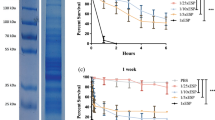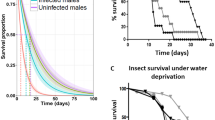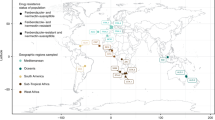Abstract
THE vulval flap of trichostrongylid nematodes is of interest to taxonomists and its presence or absence and its form are regarded as characteristic of different species. Recent work with experimental infections of Ostertagia ostertagi in calves has shown that the vulval flap, which in this species is normally large and well developed, may be greatly reduced or entirely absent in worms from resistant hosts. This is illustrated in Fig. 1.
This is a preview of subscription content, access via your institution
Access options
Subscribe to this journal
Receive 51 print issues and online access
$199.00 per year
only $3.90 per issue
Buy this article
- Purchase on Springer Link
- Instant access to full article PDF
Prices may be subject to local taxes which are calculated during checkout
Similar content being viewed by others
References
Michel, J. F., Parasitology, 53, 63 (1963).
Author information
Authors and Affiliations
Rights and permissions
About this article
Cite this article
MICHEL, J. Morphological Changes in a Parasitic Nematode due to Acquired Resistance of the Host. Nature 215, 520–521 (1967). https://doi.org/10.1038/215520a0
Received:
Published:
Issue Date:
DOI: https://doi.org/10.1038/215520a0
This article is cited by
-
Polymorphism in nematodes
Systematic Parasitology (1981)
Comments
By submitting a comment you agree to abide by our Terms and Community Guidelines. If you find something abusive or that does not comply with our terms or guidelines please flag it as inappropriate.



